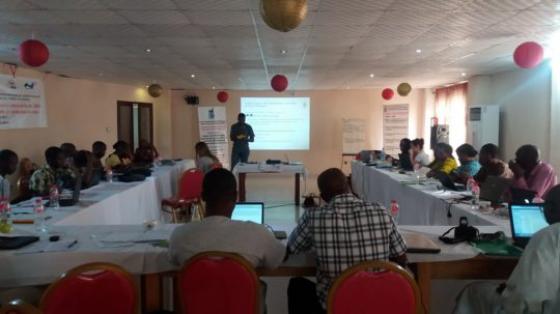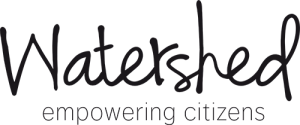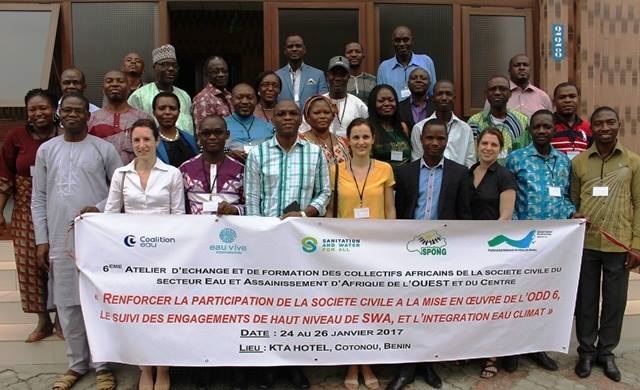Strong developments in advocacy practices for water and sanitation for all

From 24th to 26th January 2017, representatives of African collectives in the water and sanitation sector, from 9 countries in West and Central Africa, met in Cotonou, Benin. This workshop was part of the collective drive launched by the Water Coalition in 2008 to strengthen the voice of civil society in the water and sanitation sector in sub-Saharan Africa.
This 6th Annual Exchange Workshop was organized by the Water Coalition, the Permanent Secretariat of Non-Governmental Organizations (SPONG) of Burkina Faso, Eau Vive and the Benin Water Partnership, and with the collaboration of the Sanitation and Water for All. It brought together Civil Society Organizations (CSOs) from 9 countries: Benin, Burkina Faso, Cameroon, Guinea, Mali, Mauritania, Niger, Senegal and Togo. In addition to the organizers, representatives from the Water Integrity Network (WIN) and Watershed participated.
STRONG DEVELOPMENTS IN ADVOCACY PRACTICES
This annual workshop allows collectives to share their advocacy experiences for water and sanitation, and to analyze progress and issues. In all countries, collectives have seized opportunities for advocacy: presidential elections, pushing the right to water and sanitation within the constitutions, the adoption of the Sustainable Development Goals and integration into national policies, and budgetary watch.
The actions were based on a variety of advocacy tools: meetings with decision-makers, participation in consultation forums, multi-stakeholder workshops, sensitization and citizen mobilization campaigns, and media outreach.
In many countries, collectives and Civil Society networks have become the main interlocutor of the authorities on water and sanitation issues.
NEW ADVOCACY CHALLENGES
The workshop identified common policy issues and challenges, including:
- Sustainable Development Goals: Ensuring the integration of SDGs into national policies and plans, enabling their implementation and monitoring in an inclusive and participatory manner, preparing States to participate in the High Level Meetings of the Sanitation and Water for All Partnership (SWA) in April 2017 in Washington.
- Financing: ensuring budget monitoring of national or local allocations, focusing on monitoring commitments, mobilizing national resources and innovative financing, fighting corruption, improving disbursements.
- Climate: working to make water a priority for Climate strategies and policies.
Collectives and Civil Society Networks stressed the importance of including civil society in development policies and related dialogue spaces, and in particular ensuring a place for women and young people.

STRENGTHENING CONNECTIONS WITH OTHER CIVIL SOCIETY INITIATIVES
The workshop strengthened the connection of the ‘collectives work’ with other initiatives:
- The Sanitation and Water for All Partnership, which has a network of civil society focal points in countries and is an important platform of engagement for civil society partners with the organization of the High Level Meetings in April 2017, in which most governments of the West and Central Africa region will participate.
- The Watershed program, set up by Dutch NGOs in a few countries (including Mali), to strengthen sector governance and involvement of civil society.
- The Water Integrity Network, which tackles corruption in the water and sanitation sector, for greater transparency and accountability.
CALLING ON THE MINISTER OF ENERGY, WATER AND MINES OF BENIN
At the closing ceremony of the workshop, the participants had the honor of welcoming the Minister of Energy, Water and Mines of Benin, Jean-Claude Houssou.
In the presence of the media, the sub-regional dynamics of CSOs in the sector were presented, sharing the conclusions of the workshop.
This ceremony was an opportunity to challenge the Minister on the request of Beninese CSOs to give high legal status to human rights to water and sanitation by integrating them into the country’s constitution, as was done in 2015 in Burkina Faso. The Minister has responded that he would do his outmost best to guarantee the inclusion of these rights in the Constitution, assuring the support of the President of the Republic.
Civil society organizations also welcomed the implementation of Benin’s universal access to water and sanitation program of Benin by 2021, which demonstrates the country’s readiness to quickly achieve the Sustainable Development Goals. They recalled the importance of including civil society and local and regional authorities in framing, implementing and monitoring the program. In response, the Minister stressed the importance of having a high-quality civil society able to exercise a role of citizen watch and counter-power.
Blog Post by Sandra Metayer, Coordinator at the Coalition Eau (Water Coalition) a network of French NGOs.

